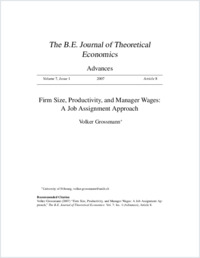Firm Size, Productivity, and Manager Wages: A Job Assignment Approach
BP2-STS
- Grossmann, Volker ORCID University of Fribourg
- 2007
Published in:
- The B.E. Journal of Theoretical Economics. - Walter de Gruyter GmbH. - 2007, vol. 7, no. 1, p. 1-39
English
Ability of managers and other nonproduction professionals is key for the productivity of firms. Hence, the assignment of heterogeneous nonproduction workers across firms determines the distribution of productivity. In turn, the transmission of productivity differences into profit differences – resulting from product market competition – determines firms’ willingness to pay for higher managerial skills. This paper explores the equilibrium assignment of nonproduction workers across ex ante identical firms which results from this interaction between product market and the market for nonproduction skills. The analysis suggests that, typically, large and productive firms coexist with small, low-productivity firms. Consistent with empirical evidence, a skewed distribution of firm size tends to arise. Moreover, the model predicts a positive relationship of firm size to productivity, manager quality, and manager remuneration. Finally, according to comparative-static analysis, higher intensity of product market competition can account for increases in the compensation at the top of the wage distribution.
- Faculty
- Faculté des sciences économiques et sociales et du management
- Department
- Département d'économie politique
- Language
-
- English
- Classification
- Economics
- License
-
License undefined
- Open access status
- green
- Identifiers
-
- DOI 10.2202/1935-1704.1321
- ISSN 1935-1704
- Persistent URL
- https://folia.unifr.ch/unifr/documents/323697
Statistics
Document views: 73
File downloads:
- 10.2202_1935-1704.1321: 100
